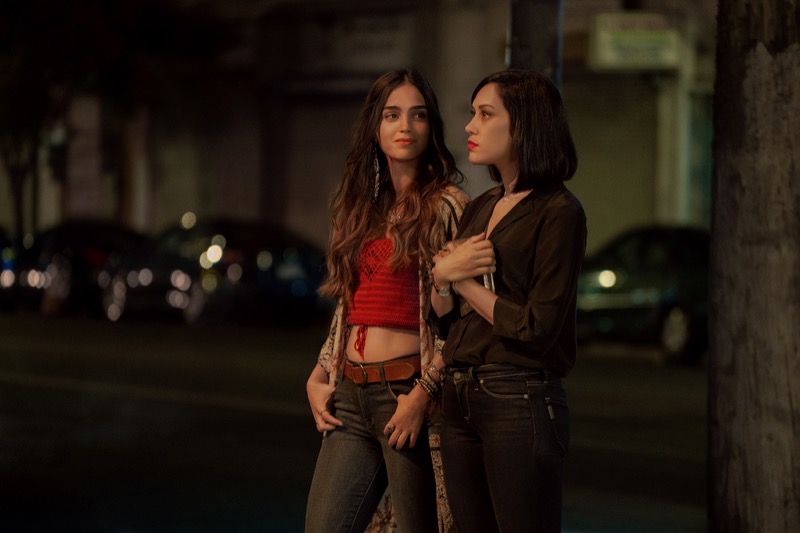
Inner Conflict and Identity Are at the Heart of “Vida” Season 2
STARZ’s “Vida” returns for a second season this week. This time around, the series about two Latinx sisters from East Los Angeles has a unique release schedule. Fans of the show will be given two options: either binge all 10 episodes at once beginning May 23rd on the STARZ app or with STARZ On Demand, or take a more traditional route and watch two episodes each week, airing Sundays on STARZ at 9 p.m. EST, starting May 26.
We caught up with showrunner Tanya Saracho and some of the “Vida” cast at Tribeca Film Festival, who gave us a taste of what to expect from Season 2.
Saracho says she wanted to give viewers — particularly the younger, more binge-friendly audience of Vida — a choice in how they watch. “STARZ asked me to write a show about Latinx millennials,” Saracho says. “Millennials of color binge — millennials in general.” If you’re wondering, Latinx is a more inclusive, gender-neutral alternative to Latino and Latina.
“Vida” season 1 recap
In the first season, sisters Emma (Mishel Prada) and Lyn (Melissa Barrera) returned to their East LA neighborhood after their mother’s death, only to discover that the bar she owned was on the verge of financial collapse. Oh — and that their mother Vidalia (Vida for short), who had kicked Emma out of their house for being lesbian at various points in her childhood, had married a woman, Eddy (Ser Anzoategui).
Season 1 confidently tackled socially relevant topics like gentrification, colorism (discrimination against people on the basis of how light or dark their skin is), and queer Latinx culture, earning it high praise from critics like Caroline Framke at Vox.
What to expect from “Vida” season 2
Season 2 picks up right where Season 1 left off: Emma and Lyn decide to make a go of turning their mother’s bar into a successful business. Lyn’s old flame Johnny (Carlos Miranda) is still trying to figure himself out. Johnny’s sister Mari (Chelsea Rendon), an anti-gentrification activist who works three jobs to support the men in her life, and who constantly clashes with Emma and Lyn, is at a crossroads.
“[Mari] has a choice, but she doesn’t know it,” Saracho says. “Her duty as a Mexican daughter, she feels it so strongly. She’s this woke, feminist, progressive activist, while still being a traditional Mexican woman.
“There’s a little more conflict within herself this season,” Rendon adds. “She wiggles, kind of, like I’ve wiggled, the last couple years.
The show was an awakening of sorts not just for Rendon, but for Miranda and other cast members. “It tapped into some things I had shoved back in my life,” Miranda says. “Almost like therapy.”
Determined to turn the bar into a successful business, Emma brings in consultant Nico (Roberta Colindrez), who skillfully threads the complex dynamics of Emma’s family and ends up becoming a sort of guide for her. “[Emma] doesn’t want to belong to a group, because belonging to a group causes pain,” Prada says. “She chooses not to identify with her queerness. It’s not that she’s denying it, she’s very comfortable — Emma does whatever Emma wants.”
It’s that reluctance to belong that fueled some of the conflict between Emma and Eddy in Season 1. “Eddy can see right through Emma,” Anzoategui says. But much of the conflict stems from Eddy being the embodiment — a physical artifact — of Vida’s hypocrisy. “Vidalia loved Eddy in a way that Emma never got to experience,” Prada adds.
According to Anzoategui and Prada there is hope for Emma and Eddy in Season 2. Small moments between the two break down barriers between them as the season begins.
Because the timeframe of the show is generally very compressed, the actors had to strive for weighted, emotional turning points in those small moments. Saracho says she loves to write those moments because humans rarely experience dramatic personality shifts in such a short amount of time.
“I love big monumental character moments within a smaller, slower story,” Saracho says, citing one moment in particular from Season 1 that sticks with her: a ride home from a rich-person party, on an empty bus save for Lyn and the housekeeper who just spent all night cleaning up the rich kids’ messes.
For Saracho, it’s a quiet moment, and nothing is really happening, but it’s so relatable and monumental at the same time.
This approach to writing worked particularly well in the first season, which was a mere six episodes, and whose events unfolded over the course of roughly nine days. The approach, which Saracho says she and her writers continued for Season 2, also lent itself well to binge-watching — purely by chance.
After writing and filming the second season, Saracho went to STARZ and pitched the idea of releasing all the episodes at once digitally. “I was sitting with it in the editing bay and realized, this is the most binge-able thing. I hope people watch in both ways.”
Program availability may have changed and is subject to change. Streaming services may require a subscription and sometimes an additional fee.




Join the conversation